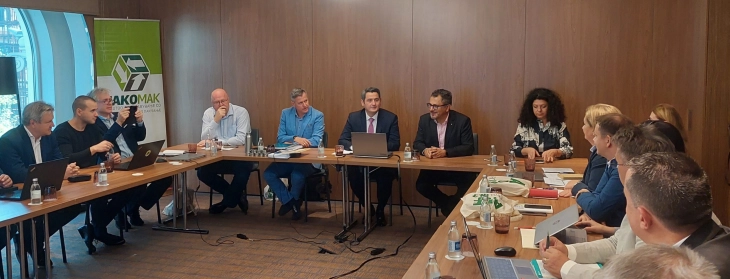Workshop: Around 30 pct of packaging waste recycled, infrastructure investments needed to ensure greater efficiency

Skopje, 28 September 2022 (MIA) - On average, around 30 percent of packaging waste placed on the market in the country, is selected, and in order to increase this percentage, the creation of infrastructure is crucial. The legal amendments, adopted last year in the Parliament, supports the construction of regional landfills and investments in infrastructure such as containers and trucks, but for their procurement, the adoption of draft law on EBRD loan is still pending.
The sale of biodegradable bags just in the first six months of the year, apart from the fact that their use has been reduced to 30%, Mden 65 million have been collected, which will be aimed at the purchasing containers and trucks for waste selection.
With the new legal amendments, in addition to citizens, producers also pay a waste tax for each product they place on our market, from which around one euro to one and a half euro per capita is collected, which is between 1.8 and 2.7 million euros per year – 65 percent of which the law stipulates to be invested in infrastructure.
Pakomak is organizing Sep. 28-29 in Skopje an international workshop on more efficient selection and recycling of packaging waste, which gathers the largest waste management companies from the region, members of the organizations PRO EUROPE and EXPRA based in Brussels, including from Greece, Bulgaria, Serbia, Romania, Hungary and Bosnia and Herzegovina, as well as representatives from Belgium, the Czech Republic and Cyprus.
According to the Minister of Environment and Physical Planning Naser Nuredini, the event serves as a basis to exchange experiences with experts from the region and the state on how to recycle waste better and more.
“One of the major issues in the package of six laws adopted by the Parliament last year related to the waste management. This means that if we can select and start with a circular economy, we will have less waste that will end up in a landfill,” Nuredini said.
“The second stage is investment in the infrastructure in the country. Unfortunately, without infrastructure in the country, we cannot fully implement the package of laws. You know that we have a draft law for a loan from the EBRD, which unfortunately has not yet been passed by the Parliamentary Committee. We expect all MPs to sit down, debate if necessary and pass the law, so that we can start building infrastructure in the country,” Nuredini underlined.
According to the Minister Nuredini, more than Mden 65 million have been collected in the Fund of the Ministry of Environment and Physical Planning from the sale of biodegradable bags by end of June.
“In accordance to the law, we cannot use those funds this year, and the programme for next year has been made, and in January we will start to purchase containers and the waste selection. This means that we will also help the collective operators of plastic, paper and other containers to be placed on our streets and give our citizens the opportunity to select the waste,” Nuredini said.
According to the Pakomak director Filip Ivanovski, the country is not far behind the region in terms of waste collection and recycling and is somewhere in the region's average and can even compete with some EU member countries from the region.
“In the country, on average 30 percent of the packaging waste, which is placed on the market, is collected. Glass, specifically, is collected more than 35 percent of what is placed on the market,” Ivanovski noted, adding “Our target is to reach 70 percent of packaging waste sorted and recycled by 2030.”







